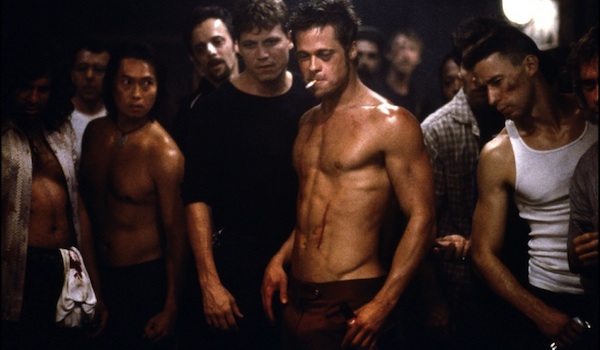Fight Club Review
The first rule of fight club (the organization) is that you don’t talk about fight club. The first rule of Fight Club (the movie) should be that you don’t try to write a review of Fight Club, for words can’t do this film justice. It’s something you have to see to believe. It’s a totally visceral experience that, ten years after its release, is still amazing first-time viewers with its cavalier attitude, phenomenal dialogue, and shocking twist.
Edward Norton plays the film’s unnamed lead character, a man who’s fed up with his life. He’s suffering from chronic insomnia. He hates his job. And the only thing that gives him any satisfaction is his furniture (and this pathetic fact only makes him hate himself more). When his apartment is blown up, he moves in with Tyler Durden (Brad Pitt), an odd man whom he met on an airplane. Tyler lives in a dump and sells homemade soap for a living. The two of them are happy enough living together and attending meetings of their “Fight Club†(a gathering of like-minded men who physically fight one another as a means of expressing themselves and letting go of their aggression). But soon, a woman named Marla (Helena Bonham Carter) threatens to drive a wedge between them, and Tyler starts to concoct some truly crazy ideas, including creating an underground terror cell to cause chaos and shake up the system.
Like I said, words don’t really do it justice. Those of you who have seen the film before know there are so many layers to this film, so many little subplots that might not mean much on the surface but add up to something special. From the group support meetings that Norton’s character and Marla attend to the crazy conclusion and Project Mayhem, Fight Club is chock full of unforgettable moments.
Its best asset, however, is the incredible direction by Fincher. I haven’t read the novel, so I can’t compare them unfortunately, but it’s the kind of story that seems really difficult to present coherently on the screen. And one could make the argument that this film isn’t entirely coherent, but it’s totally original and completely captivating. Fincher employs dozens to tricks to tell this story. There are lots of in-jokes and self-referential humor, as well as plenty of cues to the twist, which make repeat viewings very worthwhile.
I’d say Tyler Durden is the role Brad Pitt was born to play. He’s as charismatic a character as we’ve seen in film since Hannibal Lector, and while Pitt is actually a pretty solid dramatic actor (as seen in The Assassination of Jesse James by the Coward Robert Ford and, to a lesser degree, The Curious Case of Benjamin Button), he’s best in showy, scene-stealing roles like this. From the way he laughs to the crazy things he says and does, Durden is a force on-screen and easily the most fascinating character to come from a David Fincher film. Edward Norton is just as impressive in a role that’s, in many ways, more complicated than Pitt’s. He has to balance a lot of different personality traits while remaining in the dark about a lot of things. And he’s wholly successful, giving perhaps his best work this side of American History X.
Interestingly, Fight Club was a bomb when it was released theatrically. It became a cult film quickly, but now, it’s legendary. It’s one of those films, like The Matrix, that almost everyone has seen, and even if it’s too violent, crude, or convoluted for your taste, you’ll likely find something to appreciate.















